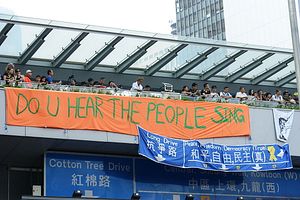China’s third highest ranking politician, Zhang Dejiang, has spelled out China’s political plans for Hong Kong.
Zhang, speaking in Beijing at the Great Hall of the People on Saturday, said that China would consolidate its sovereignty over the Special Administrative Region (SAR).
“The relationship between the central government and Hong Kong is that of delegation of power, not power-sharing,” Zhang said in a preemptive response to criticisms of increased mainland control based on the Basic Law of Hong Kong.
“Under no circumstances should the central government’s powers be confronted in the name of a high degree of autonomy,” Zhang added, according to the South China Morning Post.
The warning shot comes amid preparations for the 20th anniversary of the handover of Hong Kong back to China from the United Kingdom. Zhang, who is the National People’s Congress chairman and who also oversees Hong Kong affairs on behalf of the Chinese government, also urged local legislators to enact unpopular national security laws.
Approximately half a million people took to the streets in protest in 2003 when the Hong Kong government tried to introduce national security laws, commonly referred to as Article 23. The legislation would outlaw treason, sedition, and other acts deemed to threaten national security. The law has been widely viewed as a way for the communist Chinese government to assert its own interpretation of issues, allowing Beijing a political and military foothold in Hong Kong culture and society.
Zhang’s pointed comments highlight Beijing’s growing concerns about the young and occasionally loud independence movement in the former British colony. His speech also raises concerns as it could be interpreted as negating Hong Kong’s mini constitution. The opening article of the Basic Law states:
The National People’s Congress authorizes the Hong Kong Special Administrative Region to exercise a high degree of autonomy and enjoy executive, legislative, and independent judicial power, including that of final adjudication, in accordance with the provisions of this Law.
Zhang said Beijing would “go into further details” about the consolidation of power over Hong Kong in several areas, including political reform, its authority over the chief executive, and China’s right to appoint and dismiss key officials. However, he has already given a glimpse of how the Chinese central government views the governance of Hong Kong. In his approximately 8,000 word tirade, Zhang said that Hong Kong’s chief executive is at the core of the political and judicial system, and that China had absolute authority over the chief executive. He said that Hong Kong does not have a “three-power separation,” referring to the Western system of separation of powers. According to Zhang, Hong Kong’s legislature and judiciary do not lead or have equal authority; rather the chief executive is central.
This is concerning as it appears to be a premature reinterpretation of the “one country, two systems” principle originally promised during the handover in 1997.

































